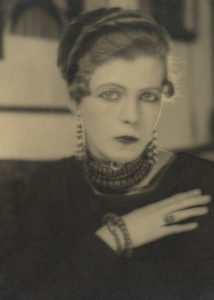
Nancy Curard
*Nancy Cunard was born on this date in 1896. She was a white European writer, heiress, civil rights activist, and politician.
Nancy Clara Cunard was born into the British upper class; her father was Sir Bache Cunard, an heir to the Cunard Line shipping businesses, a polo and fox hunting enthusiast, and a baronet. Her mother was Maud Alice Burke, an American heiress who adopted the first name Emerald and became a leading London society hostess. Young Cunard was raised on the family estate at Nevill Holt, Leicestershire, but when her parents separated in 1911, she moved to London with her mother.
Her education was at various boarding schools, including in France and Germany. She spent much of her childhood in London with her mother's longtime admirer, the novelist George Moore. She would later write a memoir about her affection for 'GM.' In 1916, she married Sydney Fairbairn, a cricketer and army officer wounded at Gallipoli. After a honeymoon in Devon and Cornwall, they lived in London in a house given to them by Nancy's mother as a wedding present. The couple separated in 1919 and divorced in 1925. Her lover, Peter Broughton-Adderley, was killed in action in France less than a month before Armistice Day. Many who knew her claimed she never fully recovered from Adderley's loss.
Cunard moved to Paris in 1920; she became involved with literary Modernism, Surrealists, and Dada. Much of her published poetry dates from this period. Also, a brief relationship with Aldous Huxley influenced several of his novels. Cunard's style, informed by her devotion to the artifacts of African culture, was startlingly unconventional. The large-scale jewelry she favored, crafted of wood, bone, and ivory, the natural materials used by native craftspeople, was provocative and controversial. At first, considered the bohemian affectation of an eccentric heiress, the fashion world came to legitimize this style as avant-garde, dubbing it the "barbaric look." Prestigious jewelry houses created their African-inspired cuff of gold beads.
In 1927, Cunard moved into a farmhouse in Normandy. It was there in 1928 that she set up the Hours Press. Previously called Three Mountains Press, William Bird, an American journalist in Paris, ran it. Cunard also wanted to support experimental poetry and provide a higher-paying market for young writers; her inherited wealth allowed her to take financial risks that other publishers could not. The Hours Press became known for its beautiful book designs and high-quality production. In 1928, she began dating Henry Crowder, an African American jazz musician working in Paris. She became active in American racial politics and civil rights and visited Harlem. In 1931, she published the pamphlet Black Man and White Ladyship, an attack on racist attitudes as exemplified by Cunard's mother, whom she quoted as saying, "Is it true that my daughter knows a Negro?" She also edited the massive Negro Anthology, collecting poetry, fiction, and nonfiction primarily by African American writers, including Langston Hughes and Zora Neale Hurston. It also included writing by George Padmore and Cunard's account of the Scottsboro Boys case.
In the mid-1930s, her anti-fascist fight included writing about Mussolini's annexation of Ethiopia and the Spanish Civil War. She predicted accurately that the "events in Spain were a prelude to another world war." Her stories about the suffering of Spanish refugees became the basis for a fundraising appeal in the Manchester Guardian. Cunard helped deliver supplies and organize the relief effort, but poor health was caused partly by exhaustion, and the conditions in the camps forced her to return to Paris, where she stood on the streets collecting funds for the refugees. She became a muse to some of the 20th century's most distinguished writers. She suffered from mental illness in later years, and her physical health deteriorated. Nancy Cunard died on March 17, 1965.